The 7 Irrational Behaviors of Black Friday
Every day of the year, American shoppers act irrationally. On Black Friday, however, shoppers’ irrationality and wildness climb to dangerously high levels. Why does Black Friday lead shoppers to grab and fight, especially when the stakes are often as low as fifty percent off toasters?
Over the last few decades, social scientists have cataloged the many different factors that lead to irrational consumer behavior, and Black Friday touches on nearly that entire list.
Luckily though, if shoppers stay aware of how Black Friday is designed to make them irrational—and if they take breaks, eat snacks, plan ahead, and keep a clear mind—then they can avoid falling victim to the “holiday.”
Here are seven reasons shoppers become so irrational and committed to deals on Black Friday, as well as a few ways you can protect yourself.
#1
Black Friday is like a hazing ritual
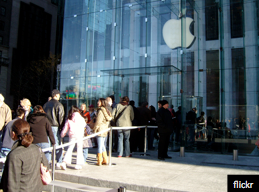 Black Friday shoppers are dedicated—they sacrifice sleep, football games, and significant others’ approval to make the early bird sales.
Black Friday shoppers are dedicated—they sacrifice sleep, football games, and significant others’ approval to make the early bird sales.
When people go through pain and effort to reach a goal, then the goal actually looks more attractive in an attempt to justify the unpleasant struggle. Effects like this are common—think of brutal college hazing rituals, where new members commit more intensely to the group rather than turn away.
A shopper’s first sleepless Black Friday is like a hazing ritual that makes the deals seem that much more attractive—they must be worth it after all that effort.
#2
Shoppers are too “depleted” to be rational
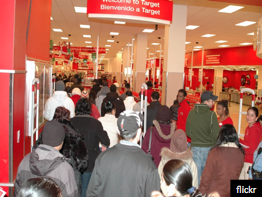
People are vulnerable to irrational tendencies all the time, but they are at their most vulnerable when they’re tired and overwhelmed. Behavioral scientists call this state “depletion.”
In a state of depletion, people just don’t have enough willpower to resist temptation or the cognitive faculties to make complex decisions. Even math whizzes and businesses majors will falter when depleted.
Black Friday shoppers arrive sleep-deprived and stressed from the holidays. For companies, Black Friday can seem like taking candy from a baby. Only here the baby resists even less.
#3
What’s another $10 after the first $500?
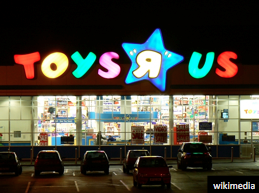 It hurts to spend money. There’s pain in parting with $10 for a flash stick. However, after spending $899 on a TV, the pain one feels parting with a Hamilton for a flash stick is practically gone.
It hurts to spend money. There’s pain in parting with $10 for a flash stick. However, after spending $899 on a TV, the pain one feels parting with a Hamilton for a flash stick is practically gone.
Restraint on Black Friday is even more unlikely because many shoppers tend to begin with the purchase of a large ticket item, like a TV or computer. After the big purchase, every $10 flash stick, $11 dollar t-shirt, or $13 kitchen knife, will not lead to the “pain of paying” that keeps people from buying every random thing on aisle during the other 364 days of the year.
Nobel Prize winners Daniel Kahneman and Amos Tversky explain that people are initially “loss averse”: initially people really do not like losing money. However, once people start losing money, their aversion to losing money starts to go away. Accordingly, cautious spenders can quickly become big spenders.
#4
The shopping momentum phenomenon
 Ever thought your friends turn into entirely different people when they go shopping? Well, scientific research suggests that indeed shopping does change people.
Ever thought your friends turn into entirely different people when they go shopping? Well, scientific research suggests that indeed shopping does change people.
Yale consumer researcher Ravi Dhar and colleagues find we are in a careful “deliberative” mind-set before purchasing an item—carefully weighing the pros and cons. Yet after the first purchase, a floodgate of “shopping momentum” opens up, and we make purchases more readily after.
Fortunately, the phenomenon of “shopping momentum” can be interrupted by a break in shopping. However, on frantic Black Friday breaks rarely occur, so shopping momentum is likely to persist for hours, if not the entire day.
#5
The Halo Effect — Amazing By Association
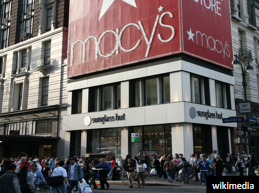 One problem for shopper rationality is that the amazing door buster deals on Black Friday may create a “Halo Effect” such that even the bad deals seem amazing by association.
One problem for shopper rationality is that the amazing door buster deals on Black Friday may create a “Halo Effect” such that even the bad deals seem amazing by association.
Black Friday shoppers are better off thinking of Black Friday as a day that has both good and some bad deals. Not every sale is a bargain.
#6
Black Friday requires math skills many consumers don’t have
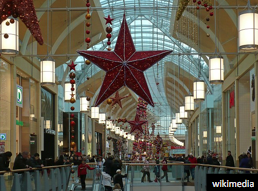 To distinguish the good from the bad deals, it takes a little bit of math. But research shows many adult Americans lack the basic math skills necessary to evaluate the merits of a deal. For instance, many Americans don’t know that 10 percent of 1,000 is 100 or that 1/4 is larger than 3/20.
To distinguish the good from the bad deals, it takes a little bit of math. But research shows many adult Americans lack the basic math skills necessary to evaluate the merits of a deal. For instance, many Americans don’t know that 10 percent of 1,000 is 100 or that 1/4 is larger than 3/20.
Many Americans have what is known as “low numeracy” which means missing questions that national standards say elementary children should know. Are shoppers smarter than a 5th grader? Most often, the answer is no.
If shoppers don’t have the math skills, they are likely to get swept up in Black Friday. Shoppers without strong math skills should feel encouraged to bring along a friend who does, or even utilize smart phone applications that allow for better product evaluation.
#7
There’s no guilt when everybody’s doing it
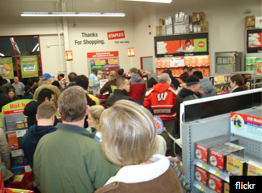 Businesses want Black Friday to be crowded. Not just because they want lots of wallets, but because crowds change people. In the case of Black Friday, crowds can remove all sense of guilt.
Businesses want Black Friday to be crowded. Not just because they want lots of wallets, but because crowds change people. In the case of Black Friday, crowds can remove all sense of guilt.
Few shoppers feel guilty buying another half-off toaster when the customers next to them have flat screens in their carts. When everybody’s peers are doing it and some peers are “doing it worse,” the painful experience of parting with money becomes a joyous spending spree.
Indeed, research on “social influence” finds that the examples of others can drive people to irrational and even unethical behavior.
Final Reminders
Don’t get too tired. Use a calculator. Decide what you want ahead of time. And don’t get brainwashed. Yes, Black Friday is fun. Yes, Black Friday is a day of great deals. But Black Friday is also a trap that’s very easy to fall into. Happy and responsible shopping everyone!
By Troy Campbell
Originally posted last Black Friday.
 Tweet
Tweet  Like
Like